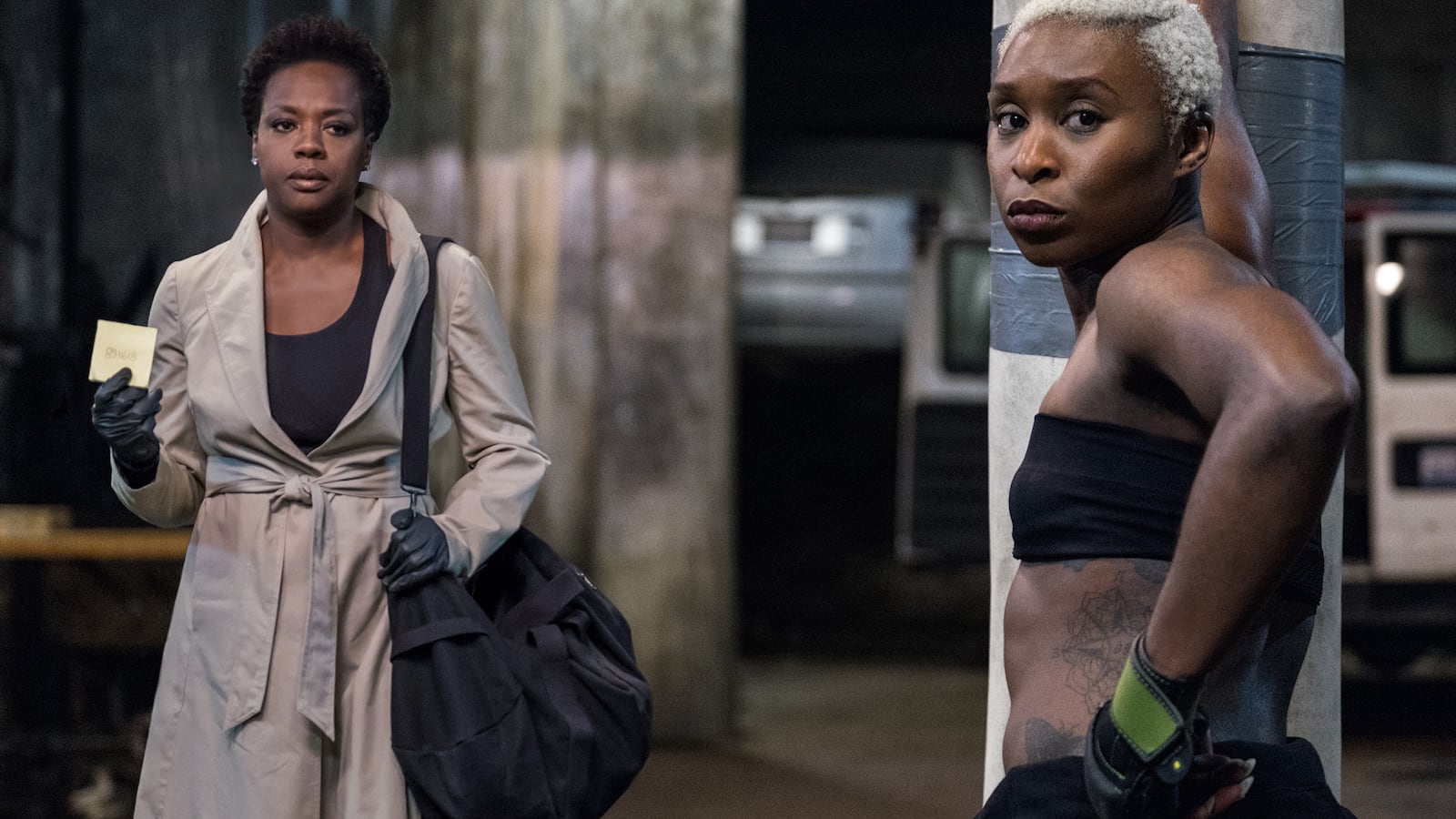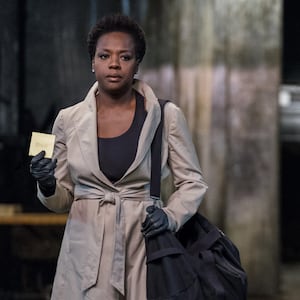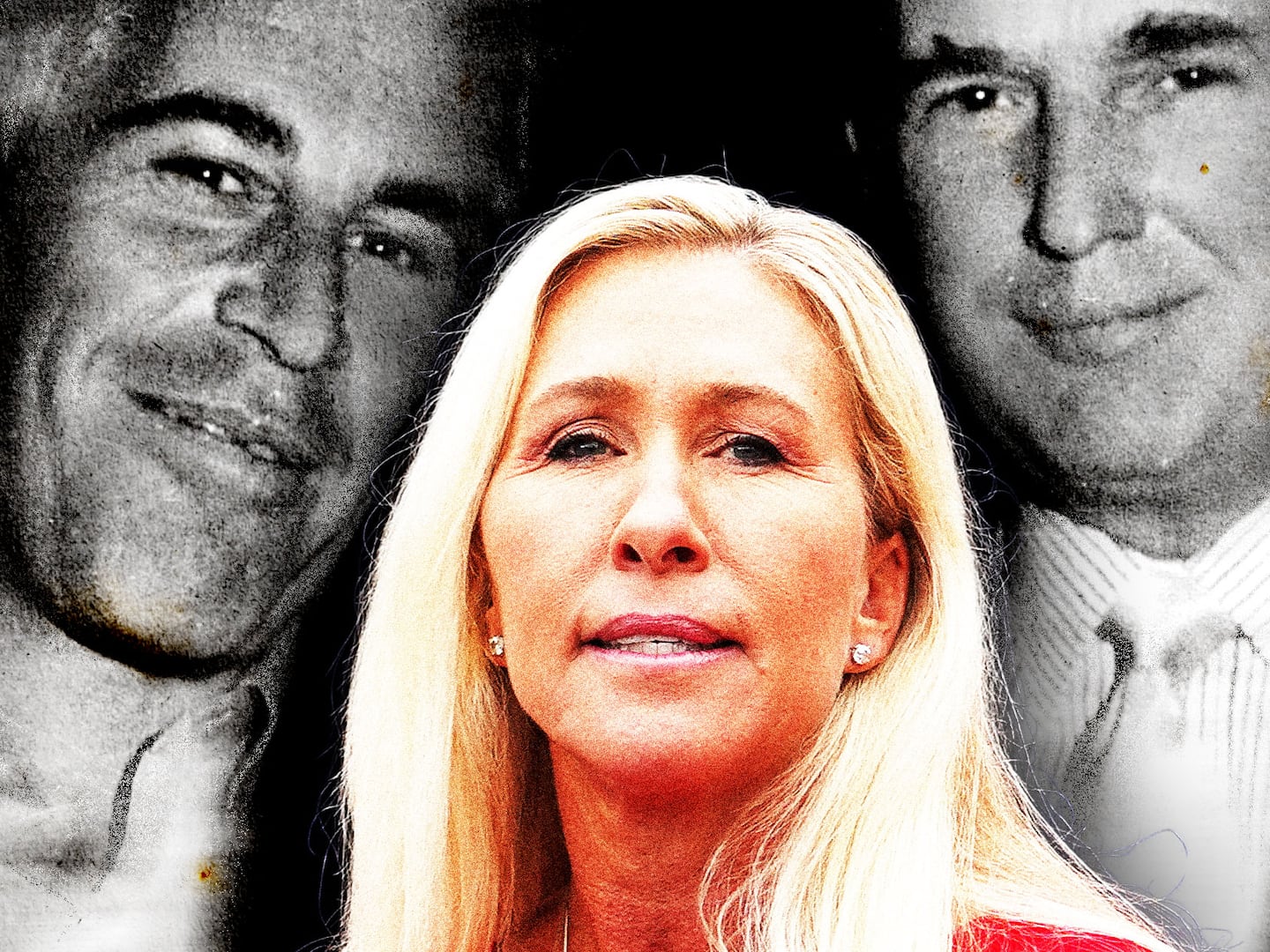In Widows, four women played by Viola Davis, Elizabeth Debicki, Michelle Rodriguez, and Cynthia Erivo procure the floor plans, the guns, the black masks, the getaway car, and, well, the balls to attempt a violent, dangerous heist.
It’s a crime of necessity. The characters played by Davis, Debicki, and Rodriguez are, as the title suggests, widowed when their husbands die in a robbery-gone-bad. They leave behind a $2 million debt that the women are now on the hook for settling, with no option but to follow in their husbands’ unscrupulous footsteps to do it.
It’s a wild ride, one that, with director Steve McQueen (12 Years a Slave, Shame) in the driver’s seat, negotiates the genre’s perilous twists and turns so masterfully that Widows should be considered a front-runner for Best Picture at the Oscars. It’s that good.
Yet the fact that critics and pundits, who near unanimously are cheering the film, wonder whether the movie, the best crime thriller made in a decade, will be taken seriously by awards voters isn’t just disappointing. It underscores an institutionalized misogyny and racism held in the industry over what an excellent—or “Best”—film is.
Because it’s women executing the heist, there’s a temptation to compare them to the stock characters played by men in these kinds of crime thrillers. What McQueen and co-writer Gillian Flynn (Gone Girl) manage to accomplish, given that obvious instinct, is remarkable. How the characters behave and the tone of the film is in near total opposition to what we’re conditioned to expect from the male-driven films of the genre. But that doesn’t mean there’s some sort of tangible femininity to Widows; in fact, it’s as muscular as any great action movie.
It’s in who these characters are, and how they relate to the task at hand. There’s no glee in the criminal acts, which are born out of desperation and necessity, not the fetishized, testosterone-tinged bad streak that pumps through so many male-driven thrillers. But that’s just speaking from a character standpoint. McQueen still directs a gratifying romp.
The characters’ motivations may be different from what we’re used to in the genre, but the audience experience is right in line with the best of them, where the turns and thrills are so clever and rousingly staged that watching becomes a physical act. Spontaneous applause broke out twice at our screening, and the collective gasp at the major turning point nearly shook the rafters.
To that end, then, Flynn and McQueen haven’t just delivered a diverse, female-led entry into the genre. They’ve elevated that genre completely, proving how much character grounding matters. It’s a tightrope walk done with the precision and spectacle befitting such a risky showbiz endeavor. It upends all the tenets at the bones of the genre—the identity, motivation, circumstance, morality, and expertise of these women—but panders to and accepts the spoils of an audience expecting the thrills of the genre.
It’s a movie that could have perhaps been a limited series on cable, unfolding over the course of an eight-hour season. That all these characters, sub-narratives, and twists are packed into a two-hour movie is audacious. It’s also why the movie is so damn good.
This is the time of the year when the Oscar race begins to clarify itself. Nothing is ever a sure thing, but this is the point when leaders of the pack begin to break away: A Star Is Born, Roma, Green Book, The Favourite, with perhaps First Man and If Beale Street Could Talk still dutifully chasing, too. The Hollywood Reporter doesn't include Widows on its list of Best Picture favorites. IndieWire doesn't either. On awards prediction site GoldDerby.com, it's currently in 10th among likely Best Picture nominees, while multiple reviews make the case that it's not an awards movie, whatever that may mean.
Such strong reviews and, if it does well this weekend, a boffo box office haul still could buoy Widows onto those lists. The fact that it isn’t already on them, after screening at all the same festivals as the other more traditionally prestigious films did and scoring generally better notices, is a shame but, historically speaking, not exactly surprising.
“Through the critique of this movie, I’ve seen sexism in a way and racism in a way, which is interesting, even if it’s a positive review,” McQueen said in an interview with Buzzfeed News. “People don’t even notice that, but when you’ve got 90 percent of the critics are white males, that’s what happens.” Given the conversations surrounding race and the Oscars in recent years, his observation could extend to the awards industry as well.
The gender and race of the characters at the center of Widows matters. (I mean, duh. It’s called Widows.) It matters to the story that three of the women planning this heist are women of color, and it is intrinsic to what makes the film a remarkable entry in the crime-heist-thriller genre. But it also matters because it is at the core of the film’s dismissal.
We don’t mean dismissal in that it’s not being celebrated. Again, the reviews are ecstatic. We mean in terms of its film-making and storytelling being taken seriously.
Widows is being hailed for its entertainment value, and applauded for being a great popcorn flick. It is both of those. It’s also stylishly directed, with a whiz script co-written by Flynn, and the stellar ensemble sprawl—Robert Duvall, Colin Farrell, Daniel Kaluuya, Brian Tyree Henry, Liam Neeson, Jacki Weaver, Carrie Coon—that would ordinarily have awards voters salivating. Any praise for its entertainment value is earned. But the praise shouldn’t stop there.
There’s a fallacy bandied about that a crime thriller like this isn’t “an Oscar movie,” as if a version of this with Johnny Depp or Leonardo DiCaprio leading a male ensemble wouldn’t automatically get the award-worthy stamp of approval, let alone if it had been directed by Martin Scorsese or Ben Affleck. Yet Widows, perhaps because of its female protagonists, gets compared and contrasted to Ocean’s 8 and ruled a crowd-pleaser.
It’s a film directed by an Oscar winner, and the first leading role from Davis, a Best Supporting Actress winner, since she took her trophy. This is an argument that requires speaking in hypotheticals, but historically that kind of pedigree would merit a movie’s inclusion on a list of awards front-runners sight unseen.
Davis’s path to a Best Actress nomination seems more certain, much in the way that, to keep it in the Gillian Flynn family, Rosamund Pike was nominated for Gone Girl while the film was passed over for Best Picture.
Scan the lists of Oscar nominees over the years and see how reliably and routinely the women nominated for Best Actress star in films that aren’t in the Best Picture race. Now compare that to the men nominated for Best Actor, overwhelmingly from Best Picture nominees. Every year and every film is different, of course. But broadly speaking, it would be fair to say that there’s a bias against films that center on women’s stories.
Versions of this debate happen each year, with pundits arguing for a small handful of popcorn movies, action films, and comedies to be included in the Best Picture race, but which don’t stand a chance for myriad reasons, chiefly that Academy voters don’t typically consider them “Oscar” films. In fact, the Academy’s dogged attempts to adapt specifically to include those kinds of movies is arguably responsible for the organization’s messiest decisions. (R.I.P. “Most Popular Movie.”)
The point of all of this is, sure, to complain about the fact that one of my favorite movies may not get the Best Picture nomination it deserves. It is also, then, to crusade for that nomination. If this works and Widows does score one, this entire column will look utterly ridiculous in a couple of months. Happily so.
But outside of our personal preferences for the year in film, it’s to use Widows’ critical accolades as a case example of the biases in the industry that are long overdue for being addressed.
In any case, see Widows. It’s fantastic.







